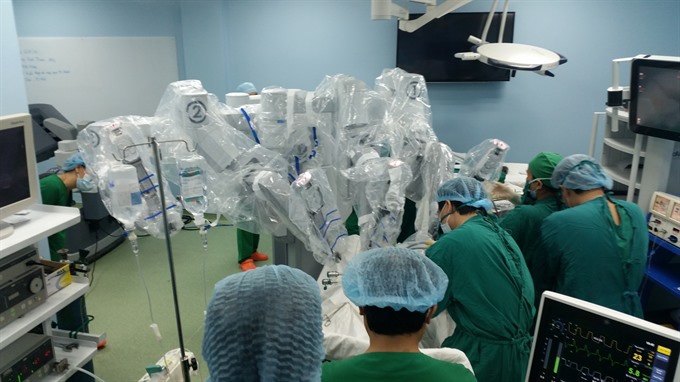 Society
Society

Prostate cancer often goes undetected because there are no symptoms when patients first contract the disease.
 |
| A robot is used to assist surgery to treat prostate cancer. Photo Courtesy of Bình Dân Hospital |
Gia Lộc
HCM CITY — A 77-year-old patient from Long An Province was urinating more often at night, leading to trouble sleeping.
His problem with frequent urination became progressively worse with time. After visiting Bình Dân Hospital in HCM City’s District 3 for treatment of the condition, he was diagnosed with prostate cancer, which is a common cancer among men that can be treated more easily if detected early on.
The hospital’s doctors prescribed laparoscopic radical prostatectomy, which is a minimally invasive surgery procedure used to remove the patient’s cancerous prostate, with the assistance of a robot.
Four days after the surgery, he had recovered.
Unfortunately, many patients with prostate cancer are not detected at an early stage like the case of the patient from the southern Long An Province.
Asso Prof Dr Nguyễn Tuấn Vinh, head of Bình Dân Hospital’s urology department, said that "patients with prostate cancer often are diagnosed at later stages, leading to a higher mortality rate in Việt Nam than in other countries.”
In 2012, 872 out of 1,275 prostate cancer patients in Việt Nam died, higher than Malaysia’s rate of 501 fatalities or Singapore’s 169 fatalities, according to International Agency for Research on Cancer’s GLOBOCAN 2012, which provides estimates of incidence, mortality and prevalence of cancers in the world.
In 2015, the country’s number of fatalities rose to 926 and is estimated to reach 1,133 in 2020, Vinh said, adding that the number of prostate cancer patients increased to 1,446 in 2015 and is estimated to get to 1,774 in 2020.
Prostate cancer often goes undetected because there are no symptoms when patients first contract the disease.
“Moreover, health facilities at many provinces, especially districts, wards or communes throughout the country, do not have advanced medical equipment to detect prostate cancer,” he added.
Many men, especially those aged above 50 years, who are at the highest risk of prostate cancer, do not have periodic examinations of their health, he said.
"That is the reason why the number of patients detecting prostate cancer is low, leading to lower rate of prostate cancer reported by hospitals than actual situation," he added.
“The health sector’s responsibility is to provide more education about cancer to improve awareness and detect more incidences on time,” Vinh said.
A national screening for the cancer should also be carried out, he added.
Moreover, men aged more than 50 years old should examine their health, including prostate, periodically, he said.
Men, whose family’s members suffer from the cancer, also should especially be screened, he added.
Treatment for advanced prostate cancer
At a medical training workshop on the latest treatments for advanced prostate cancer after it has spread to other parts of the body on May 25 held by Bình Dân Hospital, Asso Prof Dr Nguyễn Phúc Cẩm Hoàng, deputy head of the Bình Dân Hospital, said that many different therapies were used based on the cancer’s clinical categories and the risk of recurrence.
"Hormone therapy, for instance, can be combined with radiation therapy to treat prostate cancer growing outside the prostate but has not reached the bladder or rectum," he said.
Hoàng said that research showed that a combination would be more effective than a single therapy only for prostate cancer that had spread, Hoàng said.
Hormone therapy, which reduces levels of male hormones, is also used if the cancer has metastasised so badly that the condition can no longer be amenable to treatment by surgery or radiation, or if the cancer remains or comes back after treatment with surgery or radiation therapy, according to the American Cancer Society.
Vinh said that the causes of prostate cancer still had not yet been fully understood.
To prevent the cancer, doctors advise that men should have a low-fat diet and consume lots of vegetable and fruit. — VNS




